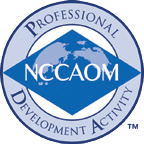The most important relationship I seek to nurture in the treatment room is the one a patient has with their own body. We live in a culture that teaches us to override pain, defer to outside authority, and push through discomfort. Patients often arrive hoping I can “fix” them, but the truth is, we can’t do the work for them. We can offer guidance, insight and support, but healing requires their full participation.
Is There Still A Need for the NCCAOM® Foreign Language Exams?
Only 158 candidates took advantage of the last offering of the NCCAOM® Foreign Language Exams (FLE) in 2009. The number of candidates for the FLEs was similar when offered in the previous administrations within the last 10 years.
In order to address the issue of an apparent decline in the number of candidates taking NCCAOM® Foreign Language Exams a FLE Stakeholder Questionnaire was compiled and distributed to Asian acupuncture and Oriental medicine membership associations, schools accredited by the Accreditation Commission for Acupuncture and Oriental Medicine (ACAOM) who offer courses in Chinese and Korean, government approved schools from both China and Korea and current NCCAOM candidates living outside the United States. No responses were received from any member of the Asian acupuncture and Oriental medicine associations or the International community.
One significant area of feedback indicated that the lack of FLE testers is due to the infrequency of the FLE administration. In response to this feedback the NCCAOM has scheduled two administrations of the NCCAOM Foreign Language Exams in 2012; August 13-25, 2012 and October 29-November 10, 2012.

Another reason to further examine the continuing need for the NCCAOM to offer FLEs, is the broader question of should a requirement for NCCAOM certification be English language proficiency? Many states do not allow passing of the NCCAOM® Foreign Language Exams as a route to obtain a license to practice without also requiring passage of a TOFEL® exam. The NCCAOM has appointed a Blue Ribbon Advisory Panel on International Eligibility and one of this panel's goals is to study and make a recommendation to the Board of Commissioners, by the end of 2012, as to whether or not all examinations should be taken in English in the future to achieve NCCAOM certification. State regulatory agencies that oversee the practice of acupuncture will be surveyed to assist the NCCAOM in determining the possible impact to the states if the NCCAOM were to discontinue offering the FLEs.
English proficiency also impacts consumer ethics and practice safety issues. An investigation is also being conducted to determine the relationship between English language proficiency, disciplinary actions and compliance to professional and ethical standards. Given the lack of FLE candidates for NCCAOM exams, state licensure requirements for English proficiency, and possible safety and ethical issues, the NCCAOM is trying to determine if the FLEs remain a necessary and vital need for the AOM community.
The NCCAOM invites all community stakeholders to provide input regarding this important topic. Please contact Irene Basore, Director of Administration at ibasore@thenccaom.org.


